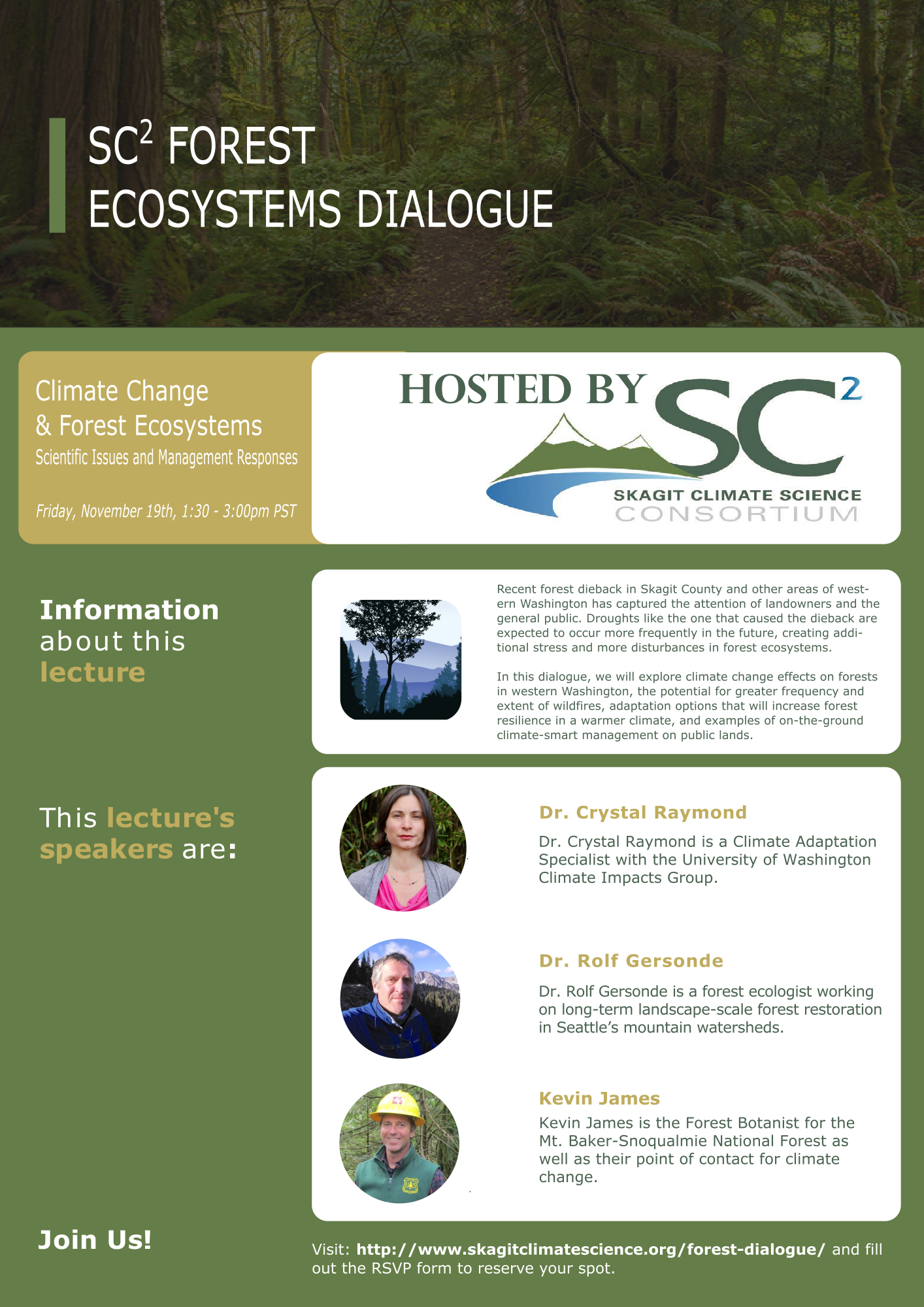SC2 Forest Ecosystems Dialogue — November 19th, 2021
Recent forest dieback in Skagit County and other areas of western Washington has captured the attention of landowners and the general public. Droughts like the one that caused the dieback are expected to occur more frequently in the future, creating additional stress and more disturbances in forest ecosystems. In this dialogue, we will explore climate change effects on forests in western Washington, the potential for greater frequency and extent of wildfires, adaptation options that will increase forest resilience in a warmer climate, and examples of on-the-ground climate-smart management on public lands.

Bios and Referenced Speaker Publications:
Dr. Crystal Raymond
PDF of Presentation Powerpoint: Crystal Raymond’s Presentation
Climate Change and Wildfire in the Northwest
Climate change will increase the potential for wildfire across the Northwest as temperatures rise and summers get drier. However, the connection between climate change and wildfire differs for different forest types across the region, as do recommended actions for increasing resilience. This presentation will provide an overview of the connections between climate change and wildfire, including best practices for landowners, agencies, and tribes that are considering how to plan for future wildfire risk.
Dr. Crystal Raymond is a Climate Adaptation Specialist with the University of Washington Climate Impacts Group. For over 10 years, she has worked as a researcher and practitioner, helping government and tribal organizations prepare for the risks associated with climate change. She conducts climate research and adaptation planning on a wide range of topics including forests, wildfires, water resources, and sea-level rise. Before working for the Climate Impacts Group, she was a climate adaptation advisor for the U.S. Forest Service and Seattle City Light.
Dr. Rolf Gersonde
PDF of Presentation Powerpoint: Rolf Gersonde’s Presentation
Options for adapting forest tree species composition in a changing climate
Current tree species compositions in Pacific Northwest forests are likely to be maladapted to future climate conditions, based on climate model projections and seed-source movement studies. Forest managers have several options for adapting seed sources and species composition to changing climate conditions depending on management objectives and site conditions. Assisted migration is one option to adapt tree species and seed sources to ensure future forest productivity and ecological functions. This presentation will discuss the background and rationale for forest species adaptation.
Dr. Rolf Gersonde is a forest ecologist working on long-term landscape-scale forest restoration in Seattle’s mountain watersheds. He learned forest management and silviculture in Germany and California, and has worked in Pacific Northwest forests for more than 20 years. His current focus is on climate adaptation and long-term monitoring of forest restoration. In his spare time, he explores the Cascade Range and promotes ecological restoration in the Pacific Northwest and globally.
Referenced Publications:
Corlett, R. T., & Westcott, D. A. (2013). Will plant movements keep up with climate change?. Trends in Ecology and Evolution 28(8): 482–488.
To access the paper, Click Here!
Hamann, A., Roberts, D. R., Barber, Q. E., Carroll, C., & Nielsen, S. E. (2015). Velocity of climate change algorithms for guiding conservation and management. Global Change Biology 21(2): 997‑1004
To access the paper, Click Here!
St. Clair, J. B., Howe, G. T., & Kling, J. G. (2020). The 1912 Douglas-Fir heredity study: Long-term effects of climatic transfer distance on growth and survival. Journal of Forestry 118(1): 1–13.
To access the paper, Click Here!
Kevin James
PDF of Presentation Powerpoint: Kevin James’s Presentation
Addressing Climate Change at the Project Scale on the Mt. Baker-Snoqualmie National Forest
This presentation will focus on how the Mt. Baker-Snoqualmie National Forest is incorporating climate change issues into the project planning process. Since the publication of Climate Change Vulnerability and Adaptation in the North Cascades Region, Washington in 2014, the forest has taken steps to implement adaptation strategies put forth in the assessment. Examples from three projects will highlight how actively managing for climate change has been incorporated into the NEPA planning process.
Kevin James is the Forest Botanist for the Mt. Baker-Snoqualmie National Forest as well as their point of contact for climate change.He is also Area Ecologist for western Washington, supporting the Gifford Pinchot National Forest and Olympic National Forest. He previously worked as a plant ecologist with the National Park Service Inventory and Monitoring Program, and as a botanist with U.S. Forest Service Pacific Northwest Research Station in Wenatchee, Washington.
Resources:
The following resources were discussed during the Forestry Dialogue and may be of use to you and your communities.
- Forest Adaptation Network
https://www.nnrg.org/climateadaptation/forest-adaptation-network/
- Seedlot Selection Tool
https://seedlotselectiontool.org/sst/
- Climate Change Adaptation Library for the Western United States
http://adaptationpartners.org/library.php
- Washington DNR Seed Zone Trial
https://www.dnr.wa.gov/publications/lm_wfn_seedzone_book.pdf
- Forest Service Seed Movement Trial
https://www.fs.usda.gov/treesearch/pubs/54998
https://www.fs.fed.us/research/highlights/highlights_display.php?in_high_id=981
- The Treeline Newsletter aims to engage PNW restoration practitioners, nursery partners and researchers who work for or represent tribes, indigenous groups, non-profits, agencies, businesses and more. We gather, disseminate, and discuss information and knowledge across a broad region in support of climate adaptation through our monthly newsletter. To sign up click the link and select the Treeline newsletter option.
https://b‑e-f.us20.list-manage.com/subscribe?u=105634bdb8a4f559d2f25eee8&id=2a90231bae
